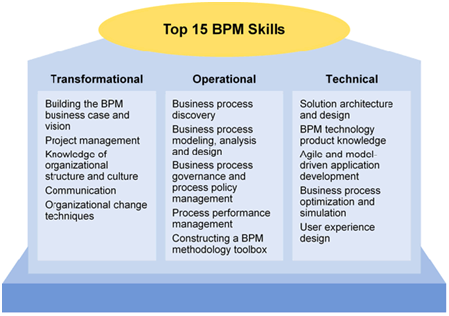One of the most frequently asked questions (FAQs) on BPM involves the skills needed for BPM success. While most people understand the importance of modeling skills, there’s a lot more involved in succeeding with BPM and it goes beyond skills or aptitude to mental models or attitude.
Earlier this year, Gartner identified 15 skills critical to the success of any BPM project. As depicted in Figure 1, they elected to group these skills into three types of critical competency: transformational, operational and technical.

Figure 1. Top 15 Business Process Management Skills[i]
While the list in Figure 1 within the framework of “transformational, operational and technical” competencies is surely a useful one to examine, it may also be worthwhile to consider other perspectives based on factors such as key practice areas and the core activities needed for success with BPM.
As outlined in the BPMInstitute.org article What is BPM Anyway, BPM is a management discipline used to improve and manage business processes, and includes the use of skills such as process discovery, process mapping and modeling, metrics, key performance indicators (KPI), collaboration, decision-making and process monitoring.
Applying the BPM discipline successfully requires becoming adept in the following nine practice areas:
- Aligning Processes with Business Strategy,
- Discovering and Modeling Processes,
- Measuring Processes,
- Analyzing and Benchmarking Processes,
- Harvesting Policies and Rules,
- Improving Processes,
- Managing the Changing of a Culture,
- Governance — decision making, and
- Deploying Technology
The set of skills needed to succeed in these key practice areas include:
- Systems thinking
- Process discovery
- Process modeling
- Facilitation skills
- Performance measurement
- Process analysis
- Process design
- Rules and decision management
- Change management
- Governance and establishing centers of excellence
- Project management
- Technical skills (BPM requirements gathering, designing user experience, optimization and simulation)
The learning path established by BPMInstitute.org and the full list of BPM courses offered reflect the Institute’s experience in building knowledge and skill development in these key areas.
The above practice areas also form the framework for BPMInstitute.org’s certification exam. In order to test that the candidates have the needed BPM skills, the certification exam measures six areas of knowledge that BPMI defines as requisite. Furthermore, some skills have more relevance than others for this level of certification. The examination provides addition emphasis on those areas by assigning more questions on the exam. This is the question coverage map for the exam:
- Process Concepts 15%
- Process Modeling 20%
- Process Improvement (Analysis & Design) 15%
- Process Measurement 15%
- Process Technologies (BPMN, BPMS) 20%
- Process-oriented Enterprise (Roles, Governance & CoE) 15%
Another useful perspective to consider is to examine the skills needed over the life cycle of a BPM project. Over a decade ago, Dr. Michael Hammer popularized the phrase “think big, start small, work fast” as a prescription for success with business process redesign in his article on The Superefficient Company (HBR, 2001). To put this principle into action, BPM professionals need to select the best candidates for process improvement by conducting an organizational assessment, effectively define BPM projects, measure and analyze current performance, redesign business processes, implement change, and create the environment for process management. When one takes an activity perspective on the skills needed for BPM, the sequence of key skills and the frequency of repetition become clearer. This does not detract from the skills identified by using the competency framework in Figure, it simply represent a different perspective. In this view, as Figure 2 depicts there are 16 critical skills, some of which are mentioned repeatedly (marked with an *).
| Activity | Critical skills |
| Organization Assessment |
|
| Project Definition |
|
| Current state analysis |
|
| Future state design |
|
| Implementation |
|
| Process Management |
|
Figure 2. Critical Business Process Management Skills
While many organizations invest in process modeling training for their people, there is need for more attention to other skill areas such as change management, facilitation, customer experience, benchmarking and governance. BPMInstitute.org offers a broad cross section of <training courses> that address the majority of skills needed for BPM success. In addition, these courses also address many of the pitfalls to avoid as depicted in Figure 3 below.
| Assessment | Modeling | Analysis | Design | Implementation | Management |
| Assuming that discovery is only about modeling and notation
Starting at the workflow level Failing to build a process architecture Ignoring organizational readiness
|
Lack of Qualified Modelers
Lack of Qualified Business Representatives Lack of User Buy-in Modeling for the sake of modeling[ii] Failing to focus on a shared understanding |
Takes too long – too slow
Issues are not specific – too general Lack of discipline in prioritization and impact analysis Premature digression into ‘design’
|
Lack of vision
Focusing solely technical aspects Relying on only a few team members Declaring victory too soon Lack of attention to implementation Lack of leadership/guiding coalition
|
Not establishing a sufficient sense of urgency
Failing to assess organizational readiness for change Bolting on technology solutions Not implementing “quick wins” Not acting promptly to remove obstacles Relying on the “usual suspects” |
Taking a technical and too narrow view of process
Failing to measure what matters to customers More focus on tools than results Insufficient communication Insufficient attention to continuous improvement |
Figure 3. Pitfalls to Avoid in Business Process Management
Examining the major pitfalls reveals the importance of attitude as well as aptitude in BPM success. An enduring focus on what matters to customers and ongoing attention to the human side of change are just two of the critical “soft side” factors.
The importance of leading process change also merits attention. Some of the key considerations that BPM professionals may wish to emphasize in this respect are:
- Looking at the business from the outside-in, from the customer’s perspective, as well as from the inside-out.
- Linking BPM programs to strategic issues (e.g. market share, growth, customer satisfaction, cost reduction, etc.)
- Addressing both facts and feelings
- Using simple, visually gripping support materials
Success with BPM is a matter of building competence. Moving up the competence curve involves both demonstrating the real value of BPM in financial terms and shifting management attention to a process based view of business. Have you considered the skills needed for BPM competence and how success also demands improved collaboration across departments?
Finally, we encourage readers to access The BPM Skills Self-Assessment Tool. This tool can be useful as an aid in assessing an individual’s current skill level and the current skill level of a Team.
[i] Gartner, February 2014
[ii] Adapted from 22 Pitfalls of Process Modeling, Dr. Michael Rosemann, 2005

















